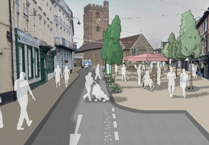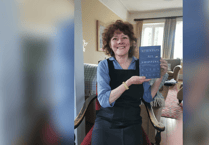Cash in reserves squirrelled away by Powys council to be used in an emergency should be used to lessen the council tax burden on hard up residents, a councillor has said.
At a stormy Powys County Council meeting today (Thursday, February 20) councillors met to set next year’s budget, which includes a council tax rise of 8.9 per cent.
The council’s anti-poverty champion, Cllr Joy Jones of the Powys Independents group said: “Hardworking people are struggling and these are people who won’t be entitled to a council tax reduction.
“They are now being hit by all the increases coming their way as we put the council tax up. This is going to have a devastating effect on many residents, and we will see more people falling on hardship.
“We’re seeing people go hungry and I’ve helped people who are going for weeks on end without being able to buy food.”
“The public can’t afford these constant increases.”
Cllr Jones asked: “Why can’t we take something from our reserves?
“We have large reserves, and I do appreciate we need them – but they were put in for emergencies and maybe we’re hitting an emergency.”
The council estimates that it has £53.358 million of total usable reserves, with £10.038 million in a general reserve fund by the end of this March.
By the end of March 2026, the total usable reserves are supposed to drop to £44.816 million, while the general reserve fund is predicted to rise to £11.014 million.
Finance portfolio holder, Labour’s Cllr David Thomas worried that dipping into the council’s reserves could lead to the authority’s effective bankruptcy.
Cllr Thomas said: “The general fund reserve or rainy day reserves is only at £10 million and it’s the third lowest in Wales.
“To do away with the council tax (rise) would use up all of that reserve – what do you do next year?
“Cut services by £20 million?
“The impact of that would be far worse on residents than anything that’s proposed in this budget - which would protect services.
“In all probability it would lead us down the road to an s114 (effective bankruptcy) and believe me, you don’t want that to happen.”
As the debate continued, Council leader, Liberal Democrat, Cllr James Gibson-Watt pleaded with councillors to back the budget.
Cllr Gibson-Watt said: “These are really difficult times and we’d all like to see lower council tax, and situations where we don’t have to find the savings. It’s a really uncomfortable place to be.”
Before the debate ended, councillors were given some good news that the council will receive more money from the Welsh Government, who have today agreed a 3.8 per cent funding floor.
In December, the council was told it would receive a 3.2 per cent rise in funding for next year from the Labour Welsh Government which equates to £7.7 million.
According to director of corporate services and s151 officer Jane Thomas, this increase will bring an extra £1.226 million to the council.
Four votes were held on the budget recommendation:
On the Medium Term Financial Strategy up to 2030, 34 councillors voted for – 25 against and four (4) abstained.
On the council tax increase, 33 councillors voted for, 26 against and four (4) abstained.
On allocating extra money from a funding floor to Highways, 54 councillors voted for, 11 against and two (2) abstained.
The other six recommendations, which includes fees and charges increases and capital strategy, were all voted upon in one block.
On these six, 37 councillors voted for, 23 against and four (4) abstained.





Comments
This article has no comments yet. Be the first to leave a comment.